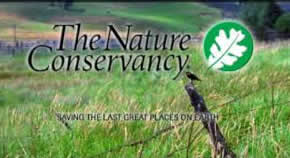TNC helps property-rights advocates not only by purporting to show that property rights can be used to protect the environment, but also by championing an approach that precludes the use of regulation to restrict what property owners can do on their property. These are issues at the heart of the Wise Use Movement.
 The Nature Conservancy works with loggers and ranchers to promote ‘sustainable’ forestry and grazing in conservation areas, thereby endorsing the concept of ‘multiple use’ or 'compatible development'. For example the Wyoming TNC has got together with the Montana Stock Growers Association and the Wyoming Stock Growers Association as well as the National Cattleman’s Beef Association, Children for the West (presumably a relation of the wise use group People for the West) and others to produced a booklet for children entitled “Ranching for Nature” which “showcases grasslands and grazing animals—both domestic and wild.”
The Nature Conservancy works with loggers and ranchers to promote ‘sustainable’ forestry and grazing in conservation areas, thereby endorsing the concept of ‘multiple use’ or 'compatible development'. For example the Wyoming TNC has got together with the Montana Stock Growers Association and the Wyoming Stock Growers Association as well as the National Cattleman’s Beef Association, Children for the West (presumably a relation of the wise use group People for the West) and others to produced a booklet for children entitled “Ranching for Nature” which “showcases grasslands and grazing animals—both domestic and wild.”
TNC programs that promote the idea of multiple use include the Last Great Places program which aims to “show that economic, recreational, and other development can be compatible with preserving nature.” It integrates economic development such as farming, forestry and ranching with conservation.
When TNC first started it sought to protect areas because of the rarity and vulnerability of the species that inhabited it. To do this TNC used to just buy and preserve land but this piecemeal approach was evidently inadequate. It soon found that this was not protecting the species on their land because of ecosystem impacts originating beyond their borders, such as pollution and water diversion. “It became clear that we needed to influence land use in larger areas surrounding the kinds of core preserves that we had traditionally acquired.”
So TNC decided it needed to protect whole ecosystems. Now it is seeking to preserve a sample bag of around 60 ecosystems—representing various geologies, topographies and climates— across the US rather than focus on particular species. It recognises that this approach is more attractive to corporate funders because it can be mapped out and goals are clear.
However TNC cannot afford to buy such large areas outright so it is having to compromise and look for ways to integrate conservation and development and for this reason TNC has found itself “involved in a number of economic ventures that may seem a bit removed from traditional land conservation measures.” It had sought to foster “business-development and marketing skills” within its own organization and it is spinning off for-profit companies such as the Virginia Eastern Shore Sustainable Development Corporation to develop and market nature-tourism programs.
 In one example of multiple use, Mobil Oil Corporation gave TNC an area of land where they had been drilling for oil because it was no longer productive enough for them. The land was significant because it was “the last known breeding ground on Earth for one of North America’s most endangered birds” – the Attwater prairie chicken (pictured). However TNC drilled new natural gas wells and grazed cattle on the area so as to make a healthy income from the land – over $5 million between 1995 and 2002. Spokesperson Niki McDaniel argued that TNC couldn’t overlook the opportunity to “raise significant sums of money for conservation… maybe it’s time we all took a walk in the oilman’s shoes”.
In one example of multiple use, Mobil Oil Corporation gave TNC an area of land where they had been drilling for oil because it was no longer productive enough for them. The land was significant because it was “the last known breeding ground on Earth for one of North America’s most endangered birds” – the Attwater prairie chicken (pictured). However TNC drilled new natural gas wells and grazed cattle on the area so as to make a healthy income from the land – over $5 million between 1995 and 2002. Spokesperson Niki McDaniel argued that TNC couldn’t overlook the opportunity to “raise significant sums of money for conservation… maybe it’s time we all took a walk in the oilman’s shoes”.
The TNC argued that these activities would not harm the prairie chickens and called the area a “working” landscape where commerce and conservation could coexist harmoniously. However environmentalists disagreed arguing that it was the risk of accidents associated with the gas extraction and pipeline that threatened the prairie chickens and that it was such developments that had put the prairie chickens on the endangered lists in the first place.
However by 2003 there was evidence that the praire birds were being compromised:
...there are fewer prairie chickens on the preserve than there were when drilling began. The number of endangered grouse nesting there has fallen from a peak of 36 in 1998 to a current estimate of 16. A previously unreported analysis by the Conservancy's Texas science director stated that the project had subjected the grouse to a "higher probability of death."
In a similar exercise, 160 oil wells operate on the TNC’s Tallgrass Prairie Preserve, in Oklahoma and several pipelines cross the preserve.
Timber companies such as Weyerhaeuser and Georgia-Pacific are allowed to log on TNC preserves in several states:
Nearly half of the 7 million acres that the conservancy said it is protecting in the United States is now being grazed, logged, farmed, drilled or put to work in some fashion. The money earned from such activities – about $7 million this year – is less than 1% of the group’s $732 million in annual revenues.
TNC is not even averse to undertaking its own free-market developments. Karen Jolly Davis reported in the Norfolk Virginia-Pilot that the Virginia branch of TNC was proposing to sell “ecologically sensitive” home sites to people who will be able to enjoy the protected waterfront and marshes owned by the Conservancy.
However the TNC argues that it is not promoting “working” landscapes for the money but rather for the example. In some cases it is even paying ranchers and farmers to continue working the land, but in a more environmentally sound way.
The TNC recognises that it will never be able to protect rare species through its acquisitions, because of the scale of land required – sometimes whole mountain ranges or watersheds are needed. Therefore they hope to do it through partnerships with those working the land.
Writing in Forbes, the business magazine, Gretchen Morgenson and Gale Eisenstodt, claim that since TNC allows oil drilling and other corporate activities to take place on its land, it proves that “commercial and environmental interests can coexist”. They give the example of the Welder Wildlife Foundation in Texas where 7,800 acres incorporate an active oilfield and a cattle ranch which help to finance the wildlife management. Citing Adam Smith, Morgenson and Eisenstodt suggest that self interest can be used to protect the environment: “Instead of seeking to curb the profit motive and freedom of individual choice, we would do well to stimulate them both in ways that let the free market reconcile the industrial revolution with the age of environmentalism”.
In 2003, following public criticism of the TNC, it resolved not to allow oil or gas drilling on its lands unless required by existing contracts.
Whilst environmental groups have been lobbying for national parks in New England, TNC has done deals with a number of paper companies involving almost a million acres of forests in Maine and New Hampshire. For example in one deal, TNC bought the mortgage for 240,000 acres of land owned by the great Northern Paper Inc. In return for a low interest rate on the mortgage, the paper company will place a conservation easement on much of the land.
In another deal that involves government money, TNC and the Trust for Public Land bought 171,500 acres from the International Paper Company. Of this 25,000 acres will be in “ecological preserves” and the rest can be logged, clear-cut, and sprayed by herbicides.
Most of the land involved in the various deals continues to be logged, although the TNC claims that “sustainable” forestry is being practiced. Such a solution is preferred by the forestry industry and by many local people because national parks would preclude forestry as well as restricting motorised access.
TNCs partnerships with forestry and paper companies and ranchers has led to criticisms that it is too ready to compromise environmental values. See Arizona Common Ground Roundtable.